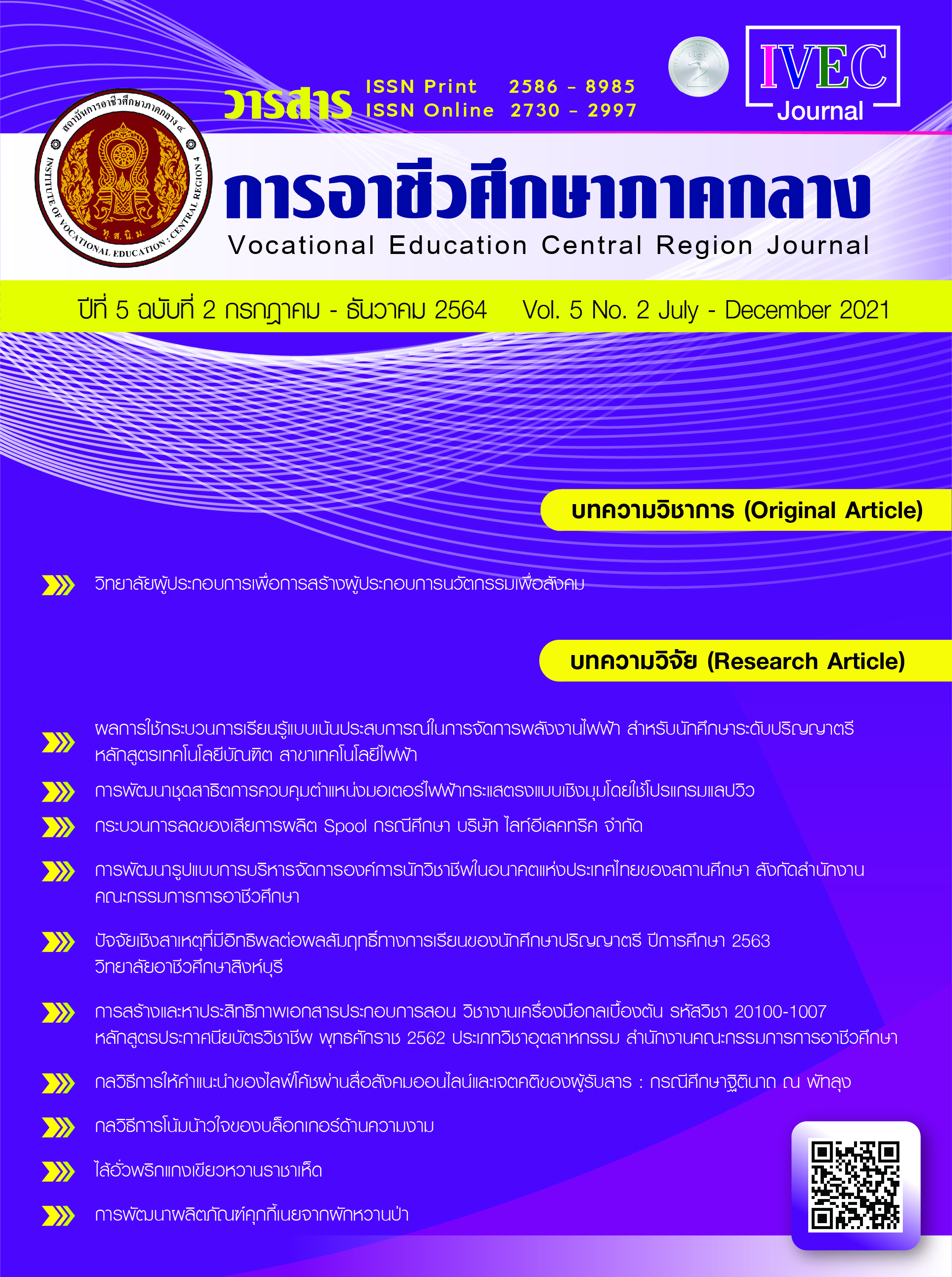A Development of an administrative model for Association of Future Thai Professional Office in Vocational Colleges under office of Vocational Education Commission
Main Article Content
Abstract
This research was a mixed method research, qualitative and quantitative research.The purposes of this research were 1) to investigate the administration of Association of Future Thai Professional (AFT) situation
2) to develop the AFT model based on the theme of empowerment with the Deming cycle (PDCA) and 3) to evaluate the AFT model. There were three main steps in this study. Firstly, the AFT situation was investigated the 30 stakeholders by using the in-dept interview. Secondly, the process of developing a model was applied Exploratory factor analysis. The sample consisted of 975 the Directors or Deputy Directors of Student Affairs Development of each college. The factor loading analysis were used Orthogonal rotational method. After that, the draft model were focus-group interview by 13 qualified persons. Thirdly, the confirmation model process used purposive sampling were 9 qualified persons. This step instruments were questionnaire form. The results for this study were as follows.
1. The result of the current situation AFT under the Office of Vocational Education Commission shown that the policy and activities were clearly presented. The specialist, morality and ethics, leadership, and democracy perspective on AFT were implemented based on various activities in students. On the other hand, the preparation, action plan and monitoring process were uncleared to applied on AFT. The teachers were not understanded on the operational process. Moreover, the structure model of AFT was widely verily used in each college.
2. The resulting pattern on the theme of empowerment was derived from an exploratory component analysis of 5 components, 43 indicators. The factor loading presented between 0.533 - 0.745. Each component was categorized according to the Deming cycle (PDCA). The “PMSTL Model”of AFT includes participation. (Participation), Motivation, Social support, Team work, and Leadership.
3. The confirming model with experts presented that the PMSTL Model presented higher level in congruity, propriety, feasibility and utility at ( = 4.73, S.D.= 0.52).
Article Details

This work is licensed under a Creative Commons Attribution-NonCommercial-NoDerivatives 4.0 International License.
|
บทความ ข้อมูล เนื้อหา รูปภาพ ฯลฯ ที่ได้รับการตีพิมพ์ในวารสาร การอาชีวศึกษาภาคกลาง ถือเป็นลิขสิทธิ์ของวารสารการอาชีวศึกษาภาคกลางหากบุคคลหรือหน่วยงานใดต้องการนำทั้งหมดหรือส่วนใดส่วนหนึ่ง ไปเผยแพร่ต่อหรือเพื่อกระทำการใด ๆ กองบรรณาธิการไม่สงวนสิทธิ์ ในการคัดลอกบทความเพื่อการศึกษาแต่ให้อ้างอิงแหล่งที่มาให้ครบถ้วน สมบูรณ์ สงวนสิทธิ์ โดย สถาบันการอาชีวศึกษาภาคกลาง 4 ที่ตั้ง 90 ถนนเทศา ตำบลพระปฐมเจดีย์ อำเภอเมือง จังหวัดนครปฐม โทรศัพท์ 034 242 856 , โทรสาร 034 242 858 ISSN : 3056-9176 (print) ISSN : 2985-2382 (online) |
References
ณัฏฐ์ณพัชร์ อ่อนตาม. (2562). เทคนิคการบริหารงานแบบ PDCA (Deming Cycle). วารสารสามคมพัฒนาวิชาชีพการบริหารการศึกษาแห่งประเทศไทย, 1,(3), หน้า 39-46.
บัณฑิตย์ สิงห์ช่างชัย. (2558). หลักสูตรฝึกอบรมการพัฒนาระบบบริหารงานกิจกรรมนักศึกษาแบบมีส่วนร่วม ของสถานศึกษาสังกัดสำนักงานคณะกรรมการการอาชีวศึกษาโดยใช้วัฎจักรของเดมมิ่ง. วิทยานิพนธ์ปรัชญาดุษฎีบัณฑิต, มหาวิทยาลัยเทคโนโลยีพระจอมเกล้า พระนครเหนือ.
พรรณิดา คำนา. (2562). ปัจจัยเอื้อต่อประสิทธิภาพการปฏิบัติงานของพนักงานสายสนับสนุน มหาวิทยาลัยศิลปากร. ปริญญาปรัชญาดุษฎีนิพนธ์, มหาวิทยาลัยศิลปกร.
พระครูปลัดสมชาย อภิวณโณ (เฮาลี้). (2558) ปัจจัยที่ส่งผลต่อความสำเร็จในการบริหารจัดการสำนักเรียนพระปริยัติธรรม แผนกบาลีในเขตปกครองคณะสงฆ์ภาค 1. วิทยานิพนธ์มหาวิทยาลัยมหาจุฬาลงกรณราชวิทยาลัย.
มนัสนิตย์ จงปัญญานนท์ (2560) (14 ตุลาคม พ.ศ. 2559). การบริหารจัดการแหล่งเรียนรู้โดยใช้สื่อและนวัตกรรมเทคโนโลยีสารสนเทศโรงเรียนในกลุ่มเครือข่ายการศึกษายมเหนือ สังกัดสำนักงานเขตพื้นที่การศึกษาประถมศึกษาแพร่ เขต 1. การบริหารจัดการแหล่งเรียนรู้.
วรากร หิรัญมณีมาศ. (2556). การพัฒนารูปแบบการบริหารองค์การช่างเทคนิคในอนาคตแห่งประเทศไทย ของสถานศึกษา สังกัดสำนักงานคณะกรรมการการอาชีวศึกษา. วารสารศึกษาศาสตร์ มหาวิทยาลัยนเรศวร ปีที่ 15 ฉบับที่ 4 ตุลาคม - ธันวาคม 2556.
ศิริรักษ์ นาคพงศ์. (2547). รูปแบบการบริหารกิจการนักเรียนการศึกษาขั้นพื้นฐานช่วงชั้นที่ 1-2 ในสถานศึกษา นครสวรรค์เขต 1. วิทยานิพนธ์ครุศาสตรมหาบัณฑิต. มหาวิทยาลัยราชภัฏนครสวรรค์, นครสวรรค์.
สง่า พุ่มพวง. (2548). สภาพการบริหารงานกิจการนักเรียนในโรงเรียนสังกัดสำนักงานเขตพื้นที่เชียงราย เขต 3. วิทยานิพนธ์ครุศาสตรมหาบัณฑิต). มหาวิทยาลัยราชภัฏเชียงราย, เชียงราย.
สำนักงานคณะกรรมการการอาชีวศึกษา. (2551). พระราชบัญญัติการอาชีวศึกษา พ.ศ.2551. กรุงเทพฯ : สำนักมาตรฐานการอาชีวศึกษาและวิชาชีพ สำนักงานคณะกรรมการการอาชีวศึกษา.
สำนักงานคณะกรรมการการอาชีวศึกษา. (2562). ระเบียบสำนักงานคณะกรรมการการอาชีวศึกษา ว่าด้วยองค์การนักวิชาชีพในอนาคตแห่งประเทศไทย พ.ศ.2557 และแนวปฏิบัติขององค์การนักวิชาชีพในอนาคตแห่งประเทศไทย พ.ศ.2557 (ปรับปรุง พ.ศ.2560). กรุงเทพฯ: สำนักงานคณะกรรมการการอาชีวศึกษา กระทรวงศึกษาธิการ.
สำนักงานคณะกรรมการการอาชีวศึกษา. (2562). หลักเกณฑ์และแนวปฏิบัติการจัดการอาชีวศึกษา ระดับประกาศนียบัตรวิชาชีพ และระดับประกาศนียบัตรวิชาชีพชั้นสูง. กรุงเทพฯ : สำนักมาตรฐานการอาชีวศึกษาและวิชาชีพ สำนักงานคณะกรรมการการอาชีวศึกษา กระทรวงศึกษาธิการ แผนกวิชาการพิมพ์ วิทยาลัยเทคนิคมีนบุรี.
สุนันต์ทา พิษณุวงษ์ และภาวิณี เพชรสว่าง. (2561). การประชุมนำเสนอผลงานวิจัยบัณฑิตศึกษา ครั้งที่ 13 ประจำปีการศึกษา 2561. กรุงเทพมหานครฯ.
สุภาพร โทบุตร. (2563). ปัจจัยการทำงานเป็นทีมที่ส่งผลต่อประสิทธิภาพในการปฏิบัติงานของบุคลากรภาครัฐในจังหวัดปราจีนบุรี. วิชาเอกการจัดการ คณะบริหารธุรกิจ มหาวิทยาลัยรามคำแหง.
หฤทัย มีนะพันธ์. (2550). หลักการวิเคราะห์โครงการและปฏิบัติเพื่อศึกษาความเป็นไปได้ของโครงการ. กรุงเทพฯ: จุฬาลงกรณ์มหาวิทยาลัย.
เอกภูมิ เจียมวิทยานุกูล. (2561). แนวทางการเสริมสร้างความเป็นพลเมืองในระบอบประชาธิปไตยบนฐานสมรรถนะความเป็นพลเมืองในศตวรรษที่ 21 ของเยาวชนไทย. วิทยานิพนธ์ปริญญาดุษฎีบัณฑิต, จุฬาลงกรณ์มหาวิทยาลัย.
Caplan,R.B. (1976). Adtering to MedicalRegimens: Pilot Experimental in Patient Education and Social Support. Ann arbour: University of Macihigan
Cendon, E. (2018). Lifelong learning at Universities: Future perspectives for teaching and learning. Journal new approaches in educational research. 7(2) : 81-87.Retrieved form https://www.researchgate.net /publication/326409861_Lifelong_Learning_at_Universities_Future_Perspectives_for_Teaching_and_Learning
Deming, W.E. (1993). PDCA cycle a quality approach. Cambridge: MA MIT
Hair, F.J., Black, C.W., Babin, J.B, & Anderson, E.R. (2019). Multivariate Data Analysis 8th ed. New Jersey: Pearson Education.
Herzberg. F., Mausner. B., & Snyderman, B. (1959). The motivation to work. New York : McGraw-Wiler.
House, J.S. (1981). Work Stress and Social Support. Reading, Mass: Addison-Wesley.p(Wood Cock & Francis)
Richard, R. (2008,Jan). Empowerment as a Function as a Function of Contextual Self-Understanding:The Effect of Work Interest Profiling on Career Decision Self-Efficacy and Work Locus of Control.Rehabilitation Counseling Bulletin,51 (2),96-106.
Sadovnik, R. (2011). Sociology of Education A Critical Reader (2nd ed.). New York : Routledge.
Siegel M.D. & Gardner S. (2000). Contextual factor of psycsological empowerment. 29(6). 703-723.
Szilagyi, A. D. Jr. W., and Marc, J. Jr. (1990). Organizational Behavior and Performance. Glenview Illinois: Scott, Foreman and Company.
Zimmerman, M. A. (2000). Empowerment Theory. In: Rappaport, J., Seidman, E. (eds) Handbook of Community Psychology. New York: Springer.


